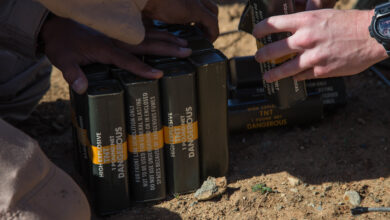The Council of the European Union established the Permanent Structured Cooperation on security and defense (PESCO) consisting of 25 member states at a Monday, December 11 meeting of the Foreign Affairs Council.
PESCO was introduced by the Lisbon Treaty and allows states participating the the joint framework to develop joint defence capabilities, invest in shared projects, and enhance the operational readiness and contribution of their armed forces.
The deal is part of a push from Germany and France for enhanced defense cooperation and follows the announcement in June of a €5.5 billion ($6.4 billion) European Defence Fund.
The states participating are: Austria, Belgium, Bulgaria, Czech Republic, Croatia, Cyprus, Estonia, Finland, France, Germany, Greece, Hungary, Italy, Ireland, Latvia, Lithuania, Luxembourg, the Netherlands, Poland, Portugal, Romania, Slovenia, Slovakia, Spain and Sweden.
On November 13, 23 states signed a joint notification on PESCO, while Ireland and Portugal signalled their intent to join the defense cooperation pact on December 7, leaving Denmark, Malta and the U.K. as the only current E.U. members outside the deal.
Ireland’s decision to join PESCO is controversial. Opposition lawmakers criticised the government, saying the allotted two hours parliamentary debate on the decision was minimal and warned that Ireland’s perceived neutral status could be further undermined. Others argue it is contrary to the Irish Constitution, which says that the state will not adopt a common E.U. defense where such a defense would include the participation of the state.
The council decision establishing PESCO sets out a list of commitments by members, including “regularly increasing defence budgets in real terms in order to reach agreed objectives,” as well as its governance, administrative arrangements and a list of 17 proposed initial projects in training, capability development and operational readiness.
The projects are expected to be adopted by the Council in early 2018, the release said, and include a network of logistic hubs; military mobility; a deployable military disaster relief capability; an armoured infantry fighting vehicle, amphibious assault vehicle and light armoured vehicle; and indirect fire support (EuroArtillery).
The logistic hubs and military mobility – dubbed the “military Schengen” – is a long-held goal of NATO and some E.U. member states. The European Commission on November 10 said that it along with EU High Representative and Vice President Federica Mogherini will propose a plan on military mobility in Europe by March 2018.
The conditions under which third-party states could be invited to participate in projects will also be adopted in early 2018.












